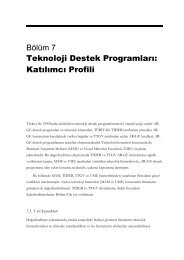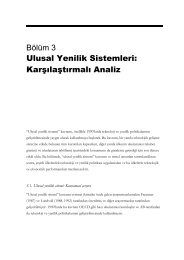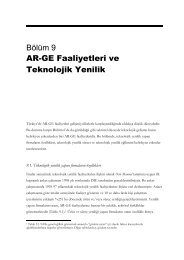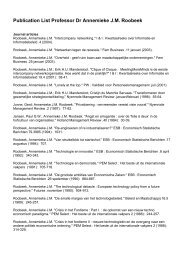The Australian Government's Innovation Report
The Australian Government's Innovation Report
The Australian Government's Innovation Report
You also want an ePaper? Increase the reach of your titles
YUMPU automatically turns print PDFs into web optimized ePapers that Google loves.
Other achievements included:<br />
• generating $22.9 million in exports, bringing the total of both programmes to over $42 million;<br />
• creating an increase in annual revenue of $43.2 million to $72.2 million;<br />
• creating more than 280 full-time or equivalent additional jobs in incubatees as of 30 June 2005 with a<br />
further 30 part-time positions also created;<br />
• attracting over $7.1 million in cash and in-kind contributions to support incubator operations, a total<br />
of $34.8 million since the start of both programmes; and<br />
• gaining recognition for the achievements of incubatees in numerous local and international industry<br />
award programmes.<br />
More information about the ICTIP can be found at: www.dcita.gov.au/ict/ict_incubators<br />
Mobile ticket box<br />
Paperless tickets are becoming available via SMS thanks to a mobile ticketing service from mobile<br />
technology company bCODE.<br />
Tickets to a range of events and services can be received through bCODE with clients including Jetstar,<br />
St George, Village Roadshow and Australia Post. <strong>The</strong>y have so far distributed more than 300 million<br />
messages on behalf of their clients globally.<br />
Unlike similar products, bCODE uses text messages rather than barcodes or graphics, so tickets are displayed<br />
on ordinary mobile phones without registration, special hardware or expensive graphic messages. This<br />
means the service is available on 99% of mobile phones.<br />
In early 2005, ADI accepted bCODE into incubation and helped it raise co-investment needed to grow<br />
and develop its scanner technology. bCODE had its technology showcased at the 2006 Melbourne<br />
Commonwealth Games and is showing potential to achieve commercial success in Australia and overseas.<br />
Encouraging companies to innovate<br />
Renewable Energy Development Initiative<br />
<strong>The</strong> Renewable Energy Development Initiative (REDI) was announced on 15 June 2004 as part of the white<br />
paper, Securing Australia’s energy future, in which the <strong>Australian</strong> Government outlined its comprehensive approach<br />
to addressing the greenhouse gas challenges associated with the production and use of energy.<br />
Renewable energy technology, alongside improving efficiency in energy supply and use, and accelerating energy<br />
market reform, are key elements of Australia’s overall greenhouse gas response in the energy sector.<br />
REDI aims to support the development of new renewable energy technology products, processes or services<br />
that have strong early-stage commercialisation and emissions-reduction potential. In supporting such projects,<br />
the programme will reduce the environmental impact of energy demand, contribute to the international<br />
competitiveness of <strong>Australian</strong> businesses and generate national benefits for the <strong>Australian</strong> economy. It will<br />
support the development of renewable energy technology products, processes and services that have strong<br />
early-stage commercialisation and emission reduction potential.<br />
<strong>The</strong> programme provides matching competitive grants totalling up to $100 million over seven years until 2011<br />
for applicants to undertake activities that produce, commercialise or establish the commercial or technical viability<br />
of a new, clearly-identified renewable energy technology-related product, process or service.<br />
66 Backing Australia’s Ability




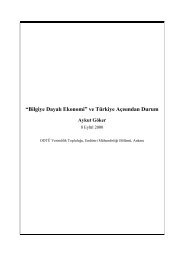
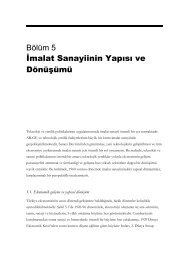
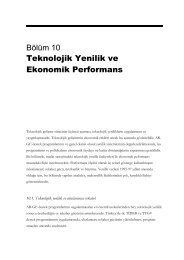

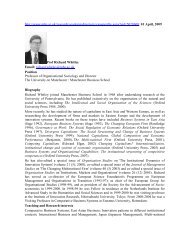

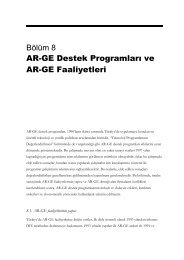
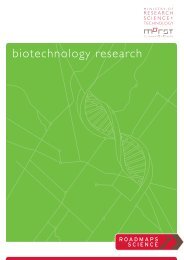
![[Tam] Uygula[ya] - Bilim, Teknoloji ve Ä°novasyon Politikaları TartıÅma ...](https://img.yumpu.com/36820041/1/184x260/tam-uygulaya-bilim-teknoloji-ve-anovasyon-politikalara-tartaama-.jpg?quality=85)
